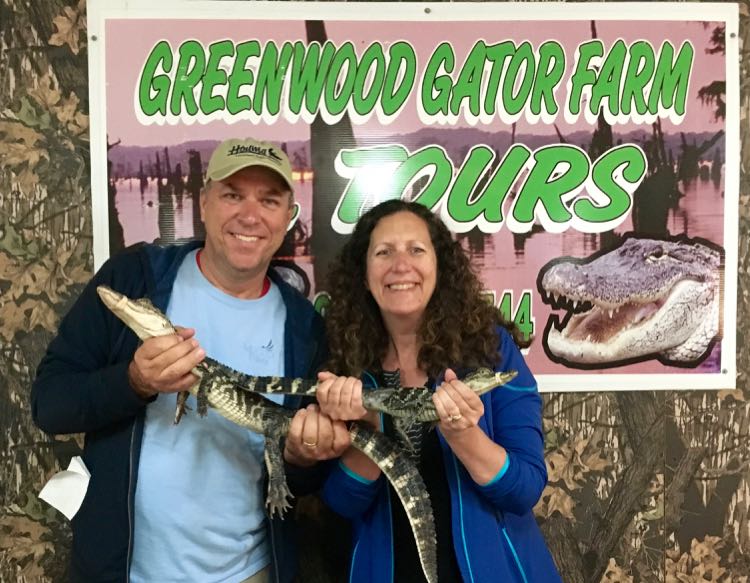Highlighting our trip to Louisiana’s Bayou Country was a visit to Greenwood Gator Farm. Learn all about the powerful and popular creatures, feed them, hold them (really!), plus take a swamp tour—all at Greenwood Gator Farm in Gibson, Louisiana, an easy day trip from New Orleans.
Greenwood Gator Farm: Bayou Tour
The Greenwood Gator Farm Tour experience begins with an hour-long airboat ride through the surrounding swamp. Big Mike—our guide for the Bayou tour at Greenwood—is a big Cajun guy with (surprising to me) German ancestry. Big Mike says he was raised on crawfish and sauerkraut cabbage. This area housed many German POW camps and after World War 2 many Germans chose to stay, he explained.
The logging industry appeared first in the Louisiana Bayou, followed by sugar cane, and then oil. German prisoners helped build the sugar cane fields. Gator farming and tourism are now the prominent industries in this part of the Louisiana Bayou.
On the airboat ride through the swamp we did not see gators at first. Being cold blooded, gators stay underwater until the air temperature is 70 degrees. Small gators heat up quicker so they surface first on chilly days. Gators only see black and white and Big Mike feeds them marshmallows.
The Bayou tour through the swamp acclimates and educates visitors about the gator’s role in the bigger picture and is a great way to start the overall experience.

Greenwood Gator Farm: Farm Tour
Greenwood Gator Farm is one of 12 gator farms in Louisiana and the only place where people can tour a working gator farm. The specific purpose is to raise and farm gators, to sell the meat and hides. Please see the Gator Farming: Background and Process sections below.
Richard Domangue started Greenwood in 1986 and Tim “The Gator Man” Domangue (his son) purchased it in 2003. Residents and visitors have selected Greenwood as the best attraction in Houma/Thibidoux two years in a row.
Tim calls the gator farm tour, The Egg to Wallet Tour. Visitors watch a film about gator farming and then walk through displays of the various phases. You can see an actual gator nest, hold gator eggs, feel gator hides (skin), and then take a photo holding a gator.
Talking with Tim, when he is onsite, is a pleasure. He is passionate about his craft and brings to life the excitement and danger of gator farming. After your Egg to Wallet Tour, visit the open pen where you can feed dozens of large gators.
For most of the year, 12,000 gators reside in the various the pens on the Greenwood grounds.

Gator Farming: Background
During the 1960s and 1970s, Louisiana commissioned a study to determine how to save gators from extinction. Only 10% of gators born in the wild survive. Gator farms, started in 1980s, have a much higher success rate (80%+). One estimate states that gators would be extinct in Louisiana within 5 years if the gator farm program ended.
Gator Farming: Process
Every July, gator farmers collect gator eggs from the wild, a dangerous and expensive operation. Gator farmers negotiate agreements with land owners to collect the eggs, then hire helicopters to locate and identify gator nests. Farmers pay the land owners $25 per egg (each egg!). Tim collects 12,000 eggs every July.
The Louisiana wildlife commission mandates that farmers cannot harm or endanger mama gators. Farmers can only bring a wooden stick to guide her away from the nest for a few minutes while they collect eggs. No guns, knives, or nets are allowed. Mama gators are very protective, of course. Collecting gator eggs is very dangerous. Don’t try this at home—or anywhere.
A mama gator abandons an empty nest, so farmers only collect some eggs. Eggs are very fragile so farmers mark each one with a black line at top to know how to transport and store in the incubator back at the farm.
All gators are born in August, 4-6 inches long. At 4.5 feet long, farmers release 12% of the gators to the wild—50,000 total from the 12 farms. The release program is so successful that the state will soon cut back the release percentage to 10%.
Eggs hatch in August so it is a busy and critical time at Greenwood. When the incubator is over 90 degrees, then the hatchlings are 95% male. Males grow faster but females sustain population better. Overall, statewide, about 20% of farmed eggs do not survive.
After processing, gator hides go to vendors in France, Singapore, and Italy while the meat goes to local restaurants.
Greenwood Gator Farm: Processing
Four weeks of gator hunting occur every September in Louisiana. The State Wildlife agency issues 35,000 tags to land owners, who sell, barter, or use the coveted tags. A very small number of tags are available through state lottery. During the “Wild Season,” Greenwood processes 6,000 gators. The processed gator meat in September is distributed throughout the nation.
For more information about Greenwood Gator Farm and Tours:
Greenwood Gator Farm and Tours: website | Facebook
Have you visited a gator farm? Seen wild gators?


